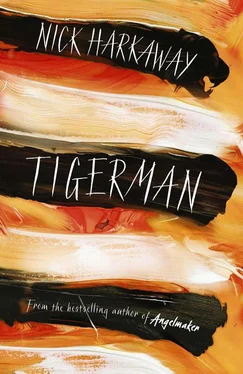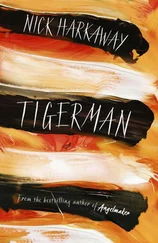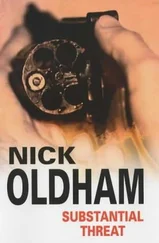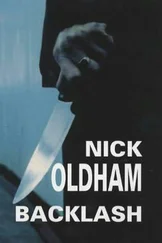The Sergeant declined the drink with thanks, though part of him very much wanted to accept. A strange, Victorian spectre dangled over him: the image of a fat, hirsute colonial administrator taking to the local drugs and losing his mind, running naked through the streets. Children laughed and pointed, women smirked. Men sucked air through their teeth as something terrible and a little bit funny happened to his exposed member. People — undefinable people, but including Kershaw, Beneseffe, the Witch, Pechorin, and of course, Kaiko Inoue and even the boy — would think less of him.
Shola shrugged and poured half the glass carefully back into the bottle, then drank the rest. The Sergeant, feeling embarrassed at this evidence of his own prudishness, accepted a bowl of soup instead, and returned his attention to Eddie Coyle.
The men came in as Shola was shifting the café from one mood to another. He had turned on the neon lights and taken the tea kettle off the hob, but he had not closed the shutters. He had gone up to the private rooms to change his workmanish daytime shirt for the extraordinarily ugly red silk one he wore at night. Every day he looked exactly the same. Perhaps he had several sets of each uniform. The Sergeant imagined a daytime closet upstairs filled with vests and aprons and grubby trousers, and opposite it an old wardrobe filled with a row of Casanova blouses, vintage 1974 from Yeah, Baby! of Brick Lane, bought from eBay and shipped by sea to Qatar and then on to Mancreu, vacuum-sealed by Shola’s explicit instruction, lest the damp creep in and they arrive covered in mould.
There were five men, and they arrived as the Sergeant finished his soup. They were local but not familiar, and from his vantage the Sergeant had time to be uncomfortable with their intent faces and their focus. He shifted his weight from the bones of his arse to his feet, and felt the muscles in his stomach tighten as he leaned forward over his empty bowl.
The shooting started.
They weren’t systematic but they made up for it with sheer aggression. They had a shotgun and four Chinese AKs. Two fishermen having dinner before going out for the evening went down first, then the dogmeat seller who always smelled of chum. Two good-time girls at the bar — Isobel and Fleur, or so they had claimed — tried to dive behind it and were hit on the way over. Then Shola.
The Sergeant saw Shola very clearly, because they were on opposing trajectories. The Sergeant was heading out, knees protesting as he hurled himself forward, but protesting in a willing way: fuck, yes, but don’t make a habit of it . He imagined he must look almost horizontal, head forward, muscles straining to keep up with his lunge for the kitchen and the back door. He had a sudden image of the boy’s comic books. Men in those stories ran like this all the time. Heroes did. Towards the action, it must be said, but they were often indestructible and in one way or another well armed. They ran like this to answer a ringing phone, sometimes.
Shola was coming down the main stairs with his barman’s rag over his shoulder, buttoning the awful shirt, the wide smile of welcome vanishing as he saw the guns, replaced by a look of horror as his early customers — his friends, mostly — started to scream. He shouted ‘Stop!’ the way people do when something utterly awful is happening and will continue to happen whatever they say. There was no expectation that it would change anything, but it must be said. The human throat could not keep it inside. People said it to bombs and hurricanes and tsunamis and wildfires. The Sergeant had seen video footage, in 2001, of a woman standing on the street bellowing it at the Twin Towers.
It never made any difference, and no one expected it to. It was the soul’s voice, in hell.
Shola’s soul was inaudible, but between stutters and bangs the men saw him. Perhaps because he was coming forward, all of them reacted. First the AKs punctured him and he jiggled like a hula dancer, arms wide as if snapping his fingers and inviting you to join in. Then the shotgun tore a fistful from his chest and he stopped being Shola and became a dead thing, flying backwards and landing on his own floor.
The Sergeant realised he was kneeling in the kitchen, concealed by the angle of the bar, and staring back into the room. The boy was still sitting where he had been when it all started. His face was spattered with something which must have come from Shola, a strange granular mixture the Sergeant had never seen before. Brain and bile, perhaps. Or Shola’s lunch. The comic book in front of the boy was ruined, piled high with dripping anatomy. The boy was staring straight ahead, quite still. The Sergeant could not decide if he had frozen or if he understood instinctively that movement would kill him.
The killers for their part looked rather surprised to have succeeded so well. They had apparently been expecting some manner of resistance. They kept their weapons trained on the boy. The only question among them appeared to be who would kill him. The Sergeant heard one of them say temoin , witness. For God’s sake, he thought. Leave him alone. Shola’s dead. It’s over.
He peeped in again and saw the point man’s eyes go from alert to cold. The boy would die in a second or two. The decision was made.
He looked down at his hands and found he was holding a metal biscuit tin. He opened it and saw a smattering of yellow grains, smelled Bird’s Custard. What was he doing with it? Ludicrously, this was quite a dangerous object: shake a teaspoon of custard powder in a box and add a flame and the whole thing goes off like a bomb. It has to do with burn rates and surface area. ‘Explosive yield,’ the Sergeant’s demolitions tutor had told him, ‘is bloody complicated, so don’t piss about with it. If you’ve got to improvise, assume you need to be a long way away.’
And then he hadn’t got the tin any more. What had he done with it? He was kneeling in a pile of discarded yellow powder. He heard a gunshot, and almost immediately afterwards he was deaf.
Part of him — the trained-soldier part, a parcel of endlessly drilled responses which required no thought, which often took over in times of crisis — had been expecting a sort of woofing noise. The best he could have hoped for was a loud pop and plenty of light to blind them. He must have got the proportions exactly right, and Shola’s tin must have had a tighter lid than advertised. Expecting? How had he been expecting anything?
He stepped through the kitchen door brandishing a long-handled copper frying pan.
Three men were on the ground, and the biscuit tin was sticking out of the far wall, blown open like a razor-edged sunflower. The two remaining killers were staring blindly, but neither of them had yet started shooting. The boy was under the heavy wooden tabletop. Adolf Hitler, the Sergeant remembered irrelevantly, had once been preserved from death by a tabletop.
He could see how it had happened quite clearly, even as he drove the pan down hard on the arms and hands of the first armed man and felt them break. The tin had flown in, and the man nearest had opened fire. A bullet, red-hot and trailing burning residues, had penetrated the tin, igniting the powder. The explosion — there was nothing else to call it — blasted the tin to pieces, firing the greater part into the wall and a cone of small fragments of hot metal directly at the hapless marksman. The bang had been deafening, which was why the Sergeant could not hear anything. The men in the fire zone would not die, though the closest probably would lose the sight in his right eye.
The second standing man was bringing up his gun. The Sergeant suspected the killer was mostly seeing fuzzy shapes, but he knew he was under attack and he knew what to do about it. A soldier or a militiaman who had seen some sort of combat. The initial attack is blunted, but that doesn’t mean you stop. You keep fighting, because the moment you stop you hand the enemy the initiative. That was right and proper.
Читать дальше
Конец ознакомительного отрывка
Купить книгу











